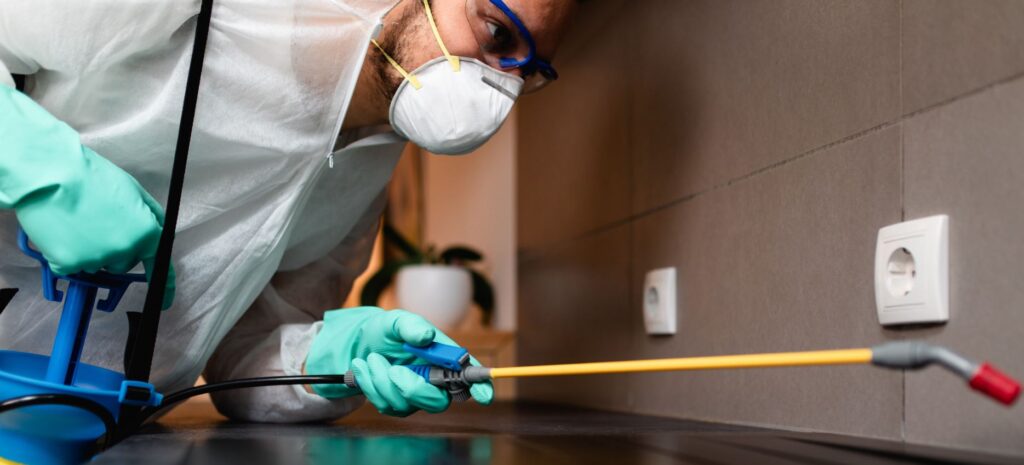Safe and Trusted Parasite Control for Lasting Defense
Effective insect administration needs a multifaceted method that stabilizes eco-friendly integrity with the requirement for efficient parasite suppression. The subtleties of these approaches may not be right away clear, motivating a more detailed examination of the practices that can lead to sustainable pest control end results.
Comprehending Parasite Control Methods
Parasite control incorporates a range of techniques focused on managing and getting rid of unwanted bugs and rats that can intimidate both wellness and building. Understanding these methods is essential for reliable parasite monitoring.
The primary classifications of bug control techniques consist of mechanical, organic, and chemical approaches. Mechanical techniques include physical barriers and traps to avoid bug access and capture undesirable species. For example, using displays on home windows or employing sticky catches can significantly lower bug populations without introducing unsafe substances.

Chemical bug control is frequently one of the most identified method, utilizing chemicals to eliminate insects. These chemicals can be efficient however must be utilized with caution to stay clear of damaging results on non-target species and the environment.
Benefits of Eco-Friendly Solutions
Exactly how can eco-friendly services transform pest control methods? The fostering of environmentally friendly bug control methods supplies many benefits, dramatically improving the performance and safety and security of pest monitoring (exterminator coquitlam). These services utilize natural components, minimizing the reliance on harmful chemicals that can present threats to human health and the setting. This shift not only protects family pets and families yet likewise reduces the possibility for soil and water contamination.

One more benefit is the favorable effect on neighborhood biodiversity. Green remedies are made to target details parasites while protecting beneficial pests and wild animals, advertising a balanced ecosystem. This approach lines up with the growing customer need for sustainable techniques, improving the online reputation of pest control companies.
Integrated Parasite Monitoring Techniques
The implementation of environmentally friendly solutions normally leads to the adoption of Integrated Bug Management (IPM) techniques, which additionally enhance parasite control effectiveness. IPM is an all natural strategy that combines multiple methods to handle insect populaces while reducing environmental effect. This strategy highlights the usage of biological, cultural, mechanical, and chemical controls, making certain a well balanced and sustainable technique of pest administration.
One essential element of IPM is the extensive evaluation of insect task and ecological problems. By checking parasite populations and recognizing their life process, experts can implement targeted treatments that interfere with the bug's habitat or lifecycle, reducing dependence on chemical pesticides. Furthermore, cultural techniques such as plant rotation and environment adjustment can significantly diminish parasite establishment and reproduction.
An additional crucial element is making use of organic control agents, such as useful insects or microbes, which can normally reduce pest populations. When chemical applications are required, IPM focuses on making use of low-risk chemicals and find this applies them uniquely, reducing exposure to non-target microorganisms and human beings.
Incorporating IPM methods not only improves pest control performance but also advertises a safer environment, lining up with the growing demand for sustainable methods in pest administration.
Safe Practices for Property Owners
Recognizing the importance of secure techniques in insect control can equip property owners to properly manage bug issues while securing their health and the environment. Executing preventive measures and non-toxic methods is critical in decreasing direct exposure to damaging chemicals.
Home owners need to first assess their atmosphere for conditions that draw in bugs, such as standing clutter, food, and water waste. Frequently cleaning and sealing entry factors can deter insects from attacking the home. Making use of all-natural deterrents, such as crucial oils or diatomaceous planet, can provide effective choices to chemical pesticides.
When chemical treatments are necessary, homeowners ought to select items that are especially identified as risk-free for property usage. It is vital to follow application guidelines thoroughly to prevent overexposure. Utilizing targeted treatments in areas where parasites are identified, instead than blanket spraying, can substantially lower chemical use.
Last but not least, keeping open communication with insect control specialists is essential. House owners must ask about the safety of items utilized and demand green choices whenever feasible. By adopting these risk-free techniques, property owners can create a healthier living setting while successfully taking care of insect problems.

Tips for Long-Term Protection
Developing a pest administration method that emphasizes long-term security can considerably enhance the performance of the secure methods formerly talked about. To attain this, property owners need to apply routine assessments of their home, concentrating on concealed locations such as attics, basements, and crawl areas. Early detection of bug activity is essential in avoiding problems from taking hold.
These practices decrease attractants that draw parasites into the home. Sealing entry points, such as fractures around windows and doors, can successfully obstruct potential bug access.
Landscaping ought to likewise be thought about; keeping plants cut and preserving a range between plants and the home minimizes hiding spots for insects. Making use of all-natural deterrents, such as crucial oils or diatomaceous planet, can additionally dissuade problems without turning to harsh chemicals.
Lastly, teaming up with a specialist pest control service for routine examinations can offer an additional layer pop over to these guys of security. These experts can supply customized referrals and progressed treatments, ensuring that your home stays safeguarded against pests in the lengthy term.
Final Thought
In verdict, reputable and great post to read safe insect control needs a diverse approach that stresses environment-friendly techniques and incorporated parasite management. By applying all-natural deterrents, conducting routine examinations, and keeping appropriate hygiene, building proprietors can substantially reduce bug populations while securing valuable bugs and the environment. Cooperation with professional bug control services enhances the efficiency of these approaches, making sure customized options that offer lasting protection and assurance versus future invasions.
Efficient pest monitoring requires a multifaceted strategy that balances eco-friendly integrity with the requirement for effective parasite reductions. The adoption of green bug control techniques supplies many advantages, significantly boosting the performance and security of parasite management.The execution of environment-friendly remedies normally leads to the fostering of Integrated Insect Monitoring (IPM) methods, which better improve parasite control efficacy. exterminator coquitlam. By keeping track of insect populations and determining their life cycles, professionals can implement targeted interventions that interfere with the bug's environment or lifecycle, lowering reliance on chemical pesticides.In final thought, reliable and safe pest control calls for a diverse approach that stresses environment-friendly approaches and integrated bug management